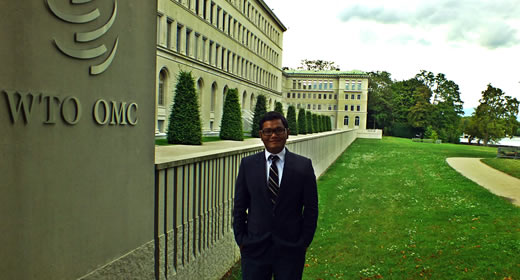
Fandi Achmad (MPP '18) submitted this field report from his summer 2017 internship at the World Trade Organization (WTO) in Geneva.
Working for the World Trade Organization (WTO) on international trade has always been a dream of mine since deciding to pursue my career in this field eight years ago. I could not imagine myself being there, however, until I met Professor Alan Deardorff at the beginning of this year and asked for his advice during my internship search.
With support from the Gerald R. Ford School of Public Policy and a strong recommendation letter from Alan, I got an internship with the Economic Research and Statistics Division (ERSD) at the WTO in Geneva, Switzerland. This opportunity allowed me to learn from and be supervised by Robert Koopman, a chief economist of the WTO. I felt so lucky, because not only was I offered an incredible internship experience at the place I had dreamed of working, but I also would be learning from and working with one of the WTO’s premier experts on international trade.
The WTO is an intergovernmental organization that regulates international trade. WTO does this by assisting member states on a daily basis to ensure that trade negotiations progress smoothly, that the rules of international trade are correctly applied and enforced, and that there's a level playing field for all, thus contributing to world`s economic growth and development. The division where I worked, ERSD, conducts economic research, collecting and disseminating trade data in support of the WTO's initiatives and activities.
I worked on two major projects during my time with ERSD. For the first, I worked on a Trade in Value Added (TiVA) report examining trends in TiVA flows and their movements within the three major regional value chains in the world: NAFTA, the EU, and Asia. I focused on contributing the sectoral analysis to highlight developments in the three regions, which will be included in the working paper, "Trade in Value Added and the Geographical Origins of Exports: the example of NAFTA, the European Union, and Asia countries," to be published by the WTO in 2017.
I also worked on the Micro, Small, and Medium Enterprises (MSMEs) efforts at the WTO. I provided a gap analysis paper for WTO agreements on MSMEs as well as a policy recommendation paper on how to include MSMEs efforts under the Doha Development Agenda. These papers are used to advise and support the works of members in the group of Friends of MSMEs at WTO. Moreover, I worked on the meetings of Friends of MSMEs group and helped to prepare the first workshop on MSMEs at WTO, inviting MSME’s experts from all around the world.
This internship also provided me with a chance to observe some of the WTO committee meetings such as Trade in Goods, Trade in Services, Agriculture, and Non-Agricultural Market Access (NAMA). It was very relevant and enriched by my experiences from my previous job in the ASEAN Secretariat, where I assisted with Regional Comprehensive Economic Partnership (RCEP) negotiations. A negotiation class from the Ford School helped me to understand the strategies each country employed during negotiations.
I believe this internship will be valuable in the future, not only for me, but for any Ford School student who wants to have a career in international trade.
Since graduating with a degree in economics from the University of Gadjah Mada, Indonesia, Fandi Achmad has dedicated his career to financial inclusion, trade and investment, and industry policies in Indonesia. He then moved to the Association of South East Asian Nations (ASEAN) Secretariat where he ran regional programs for the development of competition policy and law and continuously monitored ASEAN's progress. Fandi also served the Regional Comprehensive Economic Partnership (RCEP) Working Group on competition negotiations between ten ASEAN countries and six countries (Australia, China, India, Japan, Korea, New Zealand), drafting the Competition Chapter under RCEP Agreement. At the Ford School, Fandi is interested in learning more about trade, industry, and science and technology policies, as well as strengthening his leadership and negotiation skills.
